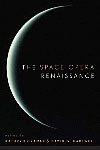Space Opera Renaissance
This massive volume collects a range of exciting science fiction that shares an interest in vast scale, great events, and baroque emotions. The editors observe that the term "space opera" was, until quite recently, a term of abuse, meaning in essence "bad science fiction". Some early writers like Leigh Brackett (who wrote the screenplay of both The Big Sleep and The Empire Strikes Back) did embrace the term, but the embrace is tinged with modesty and self-deprecation. The early space opera was closely allied to the Western; it was deeply interested in the frontier, in the relation between independent individuals and the mass of society, and in the beneficial effects of resolute action, improvisation, and violence.
In the seventies, the term was revived to stand in opposition to the excesses of the New Wave, and more recently still it has been adopted by writers, many of them British and Australian, who explore a future not patterned on the American model, a future with a leftist sensibility to set against reactionary American militarism.
Reviewing the collection in Hartwell and Cramer's own forum, The New York Review of Science Fiction, Brian Stableford argues that this historical vision is mistaken and incomplete. Speaking at Readercon a few days before publication, Hartwell himself voiced doubts concerning the overview, and uncertainty regarding the appropriate definition of space opera itself.
The great interest I find in the volume lies not in the historical and critical perplexities but in the way it uncovers and explore a remarkable political division in current space opera. Much of the rest of the world, it appears, views current American science fiction as right-wing and militaristic. The Americans, in turn, seem to have reacted by becoming even more defiantly reactionary, all the way to David Weber's "Ms. Midshipwoman Harrington" which is, very literally, Horatio Hornblower in drag. Baxter's "The Great Game" is a savage picture of
